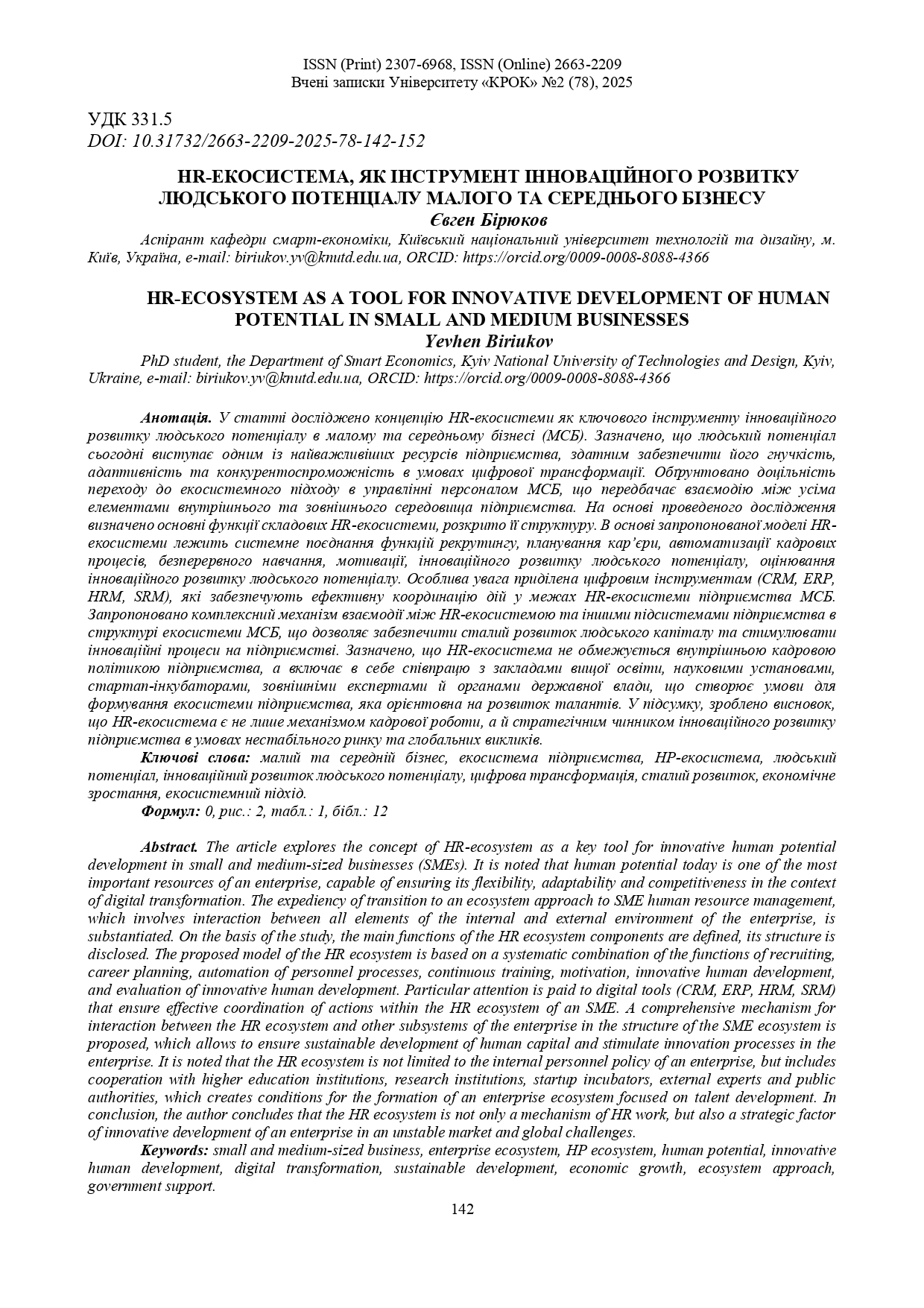HR-ECOSYSTEM AS A TOOL FOR INNOVATIVE DEVELOPMENT OF HUMAN POTENTIAL IN SMALL AND MEDIUM BUSINESSES
DOI:
https://doi.org/10.31732/2663-2209-2025-78-142-152Keywords:
small and medium-sized business, enterprise ecosystem, HP ecosystem, human potential, innovative human development, digital transformation, sustainable development, economic growth, ecosystem approach, government supportAbstract
The article explores the concept of HR-ecosystem as a key tool for innovative human potential development in small and medium-sized businesses (SMEs). It is noted that human potential today is one of the most important resources of an enterprise, capable of ensuring its flexibility, adaptability and competitiveness in the context of digital transformation. The expediency of transition to an ecosystem approach to SME human resource management, which involves interaction between all elements of the internal and external environment of the enterprise, is substantiated. On the basis of the study, the main functions of the HR ecosystem components are defined, its structure is disclosed. The proposed model of the HR ecosystem is based on a systematic combination of the functions of recruiting, career planning, automation of personnel processes, continuous training, motivation, innovative human development, and evaluation of innovative human development. Particular attention is paid to digital tools (CRM, ERP, HRM, SRM) that ensure effective coordination of actions within the HR ecosystem of an SME. A comprehensive mechanism for interaction between the HR ecosystem and other subsystems of the enterprise in the structure of the SME ecosystem is proposed, which allows to ensure sustainable development of human capital and stimulate innovation processes in the enterprise. It is noted that the HR ecosystem is not limited to the internal personnel policy of an enterprise, but includes cooperation with higher education institutions, research institutions, startup incubators, external experts and public authorities, which creates conditions for the formation of an enterprise ecosystem focused on talent development. In conclusion, the author concludes that the HR ecosystem is not only a mechanism of HR work, but also a strategic factor of innovative development of an enterprise in an unstable market and global challenges.
Downloads
References
Веклич, О. О. (2017). Сутність і зміст концепту «екосистемний підхід» в економічній науці. Науковий журнал «Економіка України». №12(673). 52-67. http://jnas.nbuv.gov.ua/j-pdf/EkUk_2017_12_5.pdf
Дубницький, В. І., Мішустіна, Т. С., Овчаренко, О. В. & Науменко, Н. Ю. (2023). Особливості розвитку бізнес-екосистеми в умовах цифрової трансформації економіки. Економічний вісник Донбасу № 3(73), 61-70. http://www.evd-journal.org/download/2023/03/08-Dubinskyi.pdf
Ільїна, М. В. & Лопес, А. Ф. (2023). Екосистемний підхід до оцінки екологічної шкоди та збитків. Сталий розвиток економіки. №2(47). DOI: https://doi.org/10.32782/2308-1988/2023-47-11
Лісіца, В. В., Михайленко, О. М., & Юрко І. В. (2022). Екосистемний підхід як інструмент розвитку та підтримки креативних індустрій на регіональному рівні. Науковий вісник Полтавського університету економіки і торгівлі. Випуск 1(105). http://puet.poltava.ua/index.php/economics/article/view/115/107
Нагара, М. Б. (2023). Специфіка та інструментарій екосистемного підходу. Науковий погляд: економіка та управління. №2(82). DOI: https://doi.org/10.32782/2521-666X/2023-82-9
Поплавська, О. М. (2024). Екосистемний підхід в дослідженні соціально-економічних систем. Сталий розвиток економіки, 2(49), 135-140. https://doi.org/10.32782/2308-1988/2024-49-21
Рулінська, О. (2021). Перспективи використання екосистемного підходу як напрямку активізації страхового маркетингу. Економіка та суспільство, (25). https://doi.org/10.32782/2524-0072/2021-25-63
Теплюк, М. А., Коваль, А. Ю. & Зубко, Є. В. (2021). Сучасні підходи до формування інноваційної бізнес-екосистеми. Збірник наукових праць «Наукові нотатки». №25(4). https://ir.kneu.edu.ua/server/api/core/bitstreams/52b469a6-927f-456a-aece-86f066d029dc/content
Циганенко, О. В., Зубко, К. Ю. & Самусь, Г. І. (2022). Формування екосистеми компанії як основи підвищення стійкості бізнесу. Економіка та суспільство. №37. https://economyandsociety.in.ua/index.php/journal/article/download/1236/1191/
Шацька, З. Я. & Бірюков, Є.В. (2025). Передумови формування людського потенціалу в контексті інноваційного розвитку та конкурентоспроможності бізнесу. Ефективна економіка. №2. https://www.nayka.com.ua/index.php/ee/article/view/5776
Шестопалов Б. (2023). Побудова екосистеми в бізнесі: навіщо це потрібно і що слід врахувати. https://mind.ua/openmind/20265463-pobudova-ekosistemi-v-biznesi-navishcho-ce-potribno-i-shcho-slid-vrahuvati
Pashchuk L. &Tavoletti Е. (2023). Entrepreneurial ecosystem formation: theoretical aspects. Економіка. 2(223). https://econom.bulletin.knu.ua/article/view/1191/1819

Downloads
Published
How to Cite
Issue
Section
License

This work is licensed under a Creative Commons Attribution-NonCommercial 4.0 International License.

